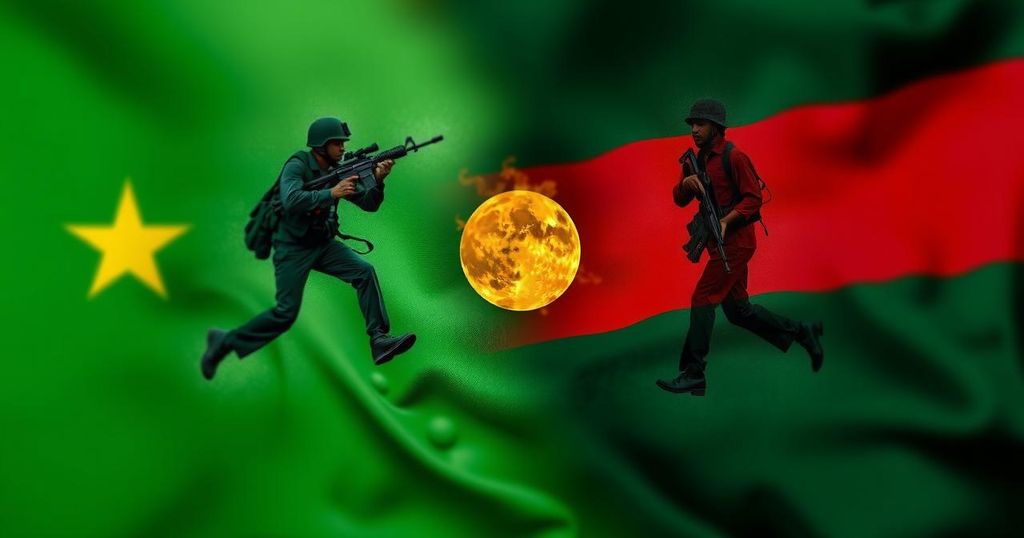Sudan-Eritrea Alliance: A Double-Edged Sword Amid Rising Tensions

Sudan’s Lt Gen Abdelfattah El Burhan recently visited Eritrea to strengthen military ties amid escalating tensions in Sudan. Discussions aimed at military coordination and economic cooperation hold potential benefits but risk igniting tribal conflicts in eastern Sudan as various armed groups become involved. Experts warn that these developments could lead to a broader escalation of violence in the region, highlighting the importance of regional stability.
On Tuesday, Sudan’s Sovereignty Council leader and Commander-in-Chief of the Sudanese Armed Forces, Lt Gen Abdelfattah El Burhan, visited Asmara, Eritrea, amid Sudan’s escalating turmoil. The meeting with Eritrean President Isaias Afwerki centered on military collaboration and economic partnerships, with Eritrea agreeing to support Sudan within a modest tactical framework. President Afwerki emphasized the significance of Sudan’s sovereignty and stability, asserting that the country’s crisis should be resolved internally with regional assistance.
During this visit, El Burhan sought to strengthen bilateral military relations while also addressing other humanitarian issues, including the impact of armed groups utilizing Eritrean territories. Eritrea accommodates camps for various eastern Sudanese armed factions, with some aligned with Sudan’s military and others focusing on their territorial defense. Eritrea aims to establish a security buffer along its border to mitigate conflict spillover.
Economic discussions included revitalizing border crossings, particularly the Kassala-El Lafa highway, which is nearly complete and expected to enhance trade relations. Afwerki’s commitment to regional stability also includes military preparedness should the conflict in Sudan intensify and spread towards eastern regions, including Kassala, El Gedaref, or the Red Sea. Political analysts express concern that these developments may inadvertently ignite tribal clashes in eastern Sudan.
Recently, eastern Sudan has seen increased tensions, with groups such as the Eastern Battalion and the Beja Congress forming new alliances with the Sudanese Armed Forces. This militarization raises the alarm for potential inter-tribal conflict, especially as armed factions trained in Eritrea become active in eastern Sudan. Observers are apprehensive that the SAF-RSF conflict may escalate into broader tribal warfare involving historically allied tribes across borders, highlighting the strategic importance of eastern Sudan and its resources.
Consequently, Sudan’s burgeoning alliance with Eritrea not only underscores military coordination but also accentuates the risks associated with deepening militarization in eastern Sudan, where unrest can lead to significant instability within the region.
The military alliance between Sudan and Eritrea is set against the backdrop of rising tensions in eastern Sudan, where various armed groups are mobilizing. Since the outbreak of conflict in Sudan, the country’s military leadership has sought to establish strategic partnerships, especially with neighboring Eritrea, which has historical ties to Sudanese military factions. The situation remains fluid as the potential for tribal conflict looms due to the involvement of multiple armed groups, trained in Eritrea’s camps, and their alignment with Sudan’s Armed Forces, raising fears of significant regional instability.
In conclusion, the recent military alliance between Sudan and Eritrea presents both opportunities and threats. While it reinforces military cooperation and seeks to stabilize the region through economic ties, it simultaneously introduces the risk of escalating tribal conflicts in eastern Sudan. The dynamics of armed groups operating in the area could lead to broader violence, pulling in historically allied tribes from neighboring regions, which underscores the complex security landscape in the Red Sea corridor. Continued monitoring and strategic diplomacy will be essential to navigate these challenges.
Original Source: www.dabangasudan.org








